Search Texas criminal records for free to find friends or family who have been incarcerated at anytime, or see the guide below on how to find recent arrests in every TX county through government repositories.
Due to the Freedom of Information Act, both arrest and Texas criminal records can be obtained in a matter of seconds if you know where to look for.
Additionally, this resource will show readers how to:
- Get ahold of a Texas inmate and post their bail
- Check for Texas arrest records, probation and parole information
- Find and obtain copies of criminal records in the state of Texas
- The best way to seal and expunge criminal records in TX
- Check for Texas state prisoners, as well as federal prisoners
- Perform a background check on anyone for personal or professional reasons
- Review and understand Texas laws surrounding public records
No matter what you’re looking for, this resource is dedicated on making Texas state records and public information searches readily accessible — specifically in regards to criminal histories.
Accessibility of Texas Criminal & Arrest Records
Criminal records in Texas are subject to the guidelines the Public Information Act outlines, and the Texas Attorney General provides support and information to agencies that provide records either for personal or professional use.
Most criminal records are considered public records in Texas and can be released to anyone who requests them. These include arrests, convictions, and civil actions such as domestic violence orders or restraining orders for Class B misdemeanors or higher.1
Driving history is also a public record and can include motor vehicle violations that are misdemeanor or felony charges.
Records that are not considered public include juvenile criminal records and those that have been sealed or expunged by a court in good standing in Texas. Investigative notes, such as those for child abuse investigations, are also not subject to disclosure to the public but may be accessible to other law enforcement agencies on a need-to-know basis.
Certain information is also removed from the record before it is released such as dates of birth, addresses or financial information.2
In addition, incident reports are typically not available for release until the case has been disposed of in court, and victim information is removed from the report before it is released, but accident reports can be provided by the state police or local law enforcement agency that took the accident report for use in insurance claims.
Withholding release of incident reports is covered in section 552.108(a)(1) of the Public Records Act.
The Texas State Attorney General provides a public information handbook that outlines the Public Records Act and helps individuals and agencies understand what records are accessible.
What Appears on Texas Criminal Records vs TX Arrest Records
Many refer to criminal records and arrest records as the same thing; however, there is a difference. Arrest records include charges that have been filed against the person, jail location, date the person was taken into custody and bond information.
Texas arrest records are not considered conviction records. An arrest report just shows someone has been accused of committing a crime. It can be expunged in matters that result in acquittal or dismissal.
Criminal records are much more extensive, showing the disposition of the case and sentencing data if the person was convicted or entered a guilty plea. Criminal records, both convictions and non-convictions can appear on a criminal history unless the matter has been expunged by the courts.
Driving history can also include criminal offense information if the individual has misdemeanor or felony driving offenses. A driving history can be obtained from the Texas Department of Public Safety in addition to a full criminal history.
The following official driving history can be obtained: all accidents and violations for the prior three years for type 2 and type 3 violations by submitting a Driver Record Request Form, which can be downloaded from the DPS website and mailed to the following address:
Texas DPS
Driving Record Request
Post Office Box 149008
Austin, Texas 78714-9008
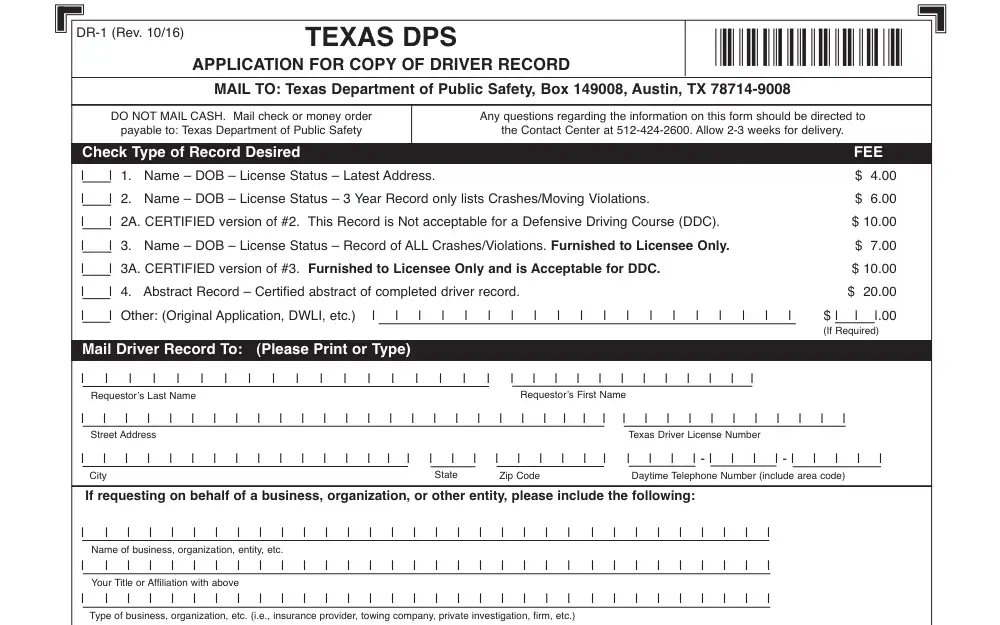
While protective orders are not considered criminal records in Texas, they are sometimes included in a background check. The Texas Judiciary maintains an online portal to check for active protective orders against individuals.

To run a protective order check, follow the steps below:
- Open the Texas Court’s website.
- Select Protective Order Registry under Judicial Data.
- Click Protective Order Registry Public Access.
- Select Search Here under Protective Orders.
- Enter the subject’s first and last name, date of birth (if known) and county where the order was entered (if known), and click Search.
If a person has an active protective order against them, the searcher will be able to view how long the order is active but does not provide details. If a criminal charge was filed from the same incident, it will appear on a criminal record report.
How To Search Texas Arrest Records for Free (Find Out Why Someone Is in Jail)
When someone is arrested and placed in jail, it’s important to know how to locate the individual for the purpose of posting a bond. In Texas, the Department of Public Safety has an online portal for locating individuals arrested in the state on a Class B misdemeanor or greater charge.
Searchers must create an account online to access the statewide database.1
Another way to find recent arrests is to reach out to the local jail directly. Texas has 254 counties, most of which have their own jails.
There are also 350 city jails in the state that can be contacted to find recent arrests; when searching Texas arrest records, the person must know where the individual was arrested and which facility they are transported to, or at least have an idea of which county or city they were in.
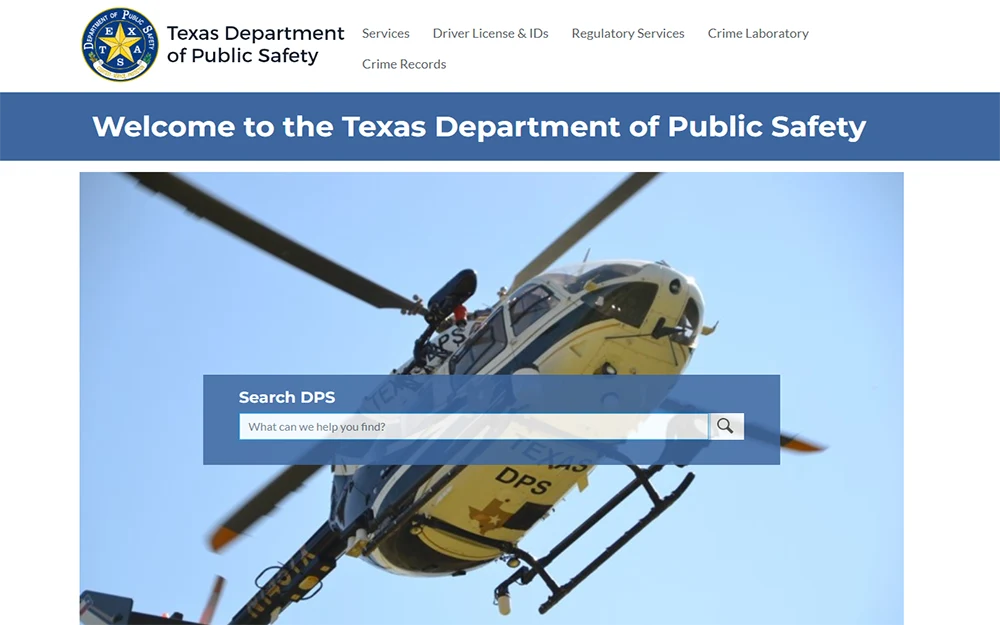
Checking with the local law enforcement agency for arrest records is the quickest way to find out if someone is in custody. While the statewide search through DPS can generate the information, there may be a delay on when the report is uploaded from the local agency; however, the Texas Department of Public Safety is the public records repository for the state.
How To Locate County Arrest Records: Inmate Lookups & Mugshots in Texas
Texas has 254 counties, each of which has a sheriff’s office that is responsible for inmate processing and housing or transporting to the nearest facility if the county does not have its own jail.
The table below lists the sheriff’s offices in Texas that have working online links to locate inmates in that particular jail. Some of these links also include mugshots of the person included in the record, but not every jail maintains a mugshot database.
Other counties in Texas either do not publish a link to search the county jail, or they do not have a facility in their county and contract with other departments to house inmates. In such cases, reviewing the instructions for finding details on inmates anywhere in Texas proves useful for a seamless lookup.
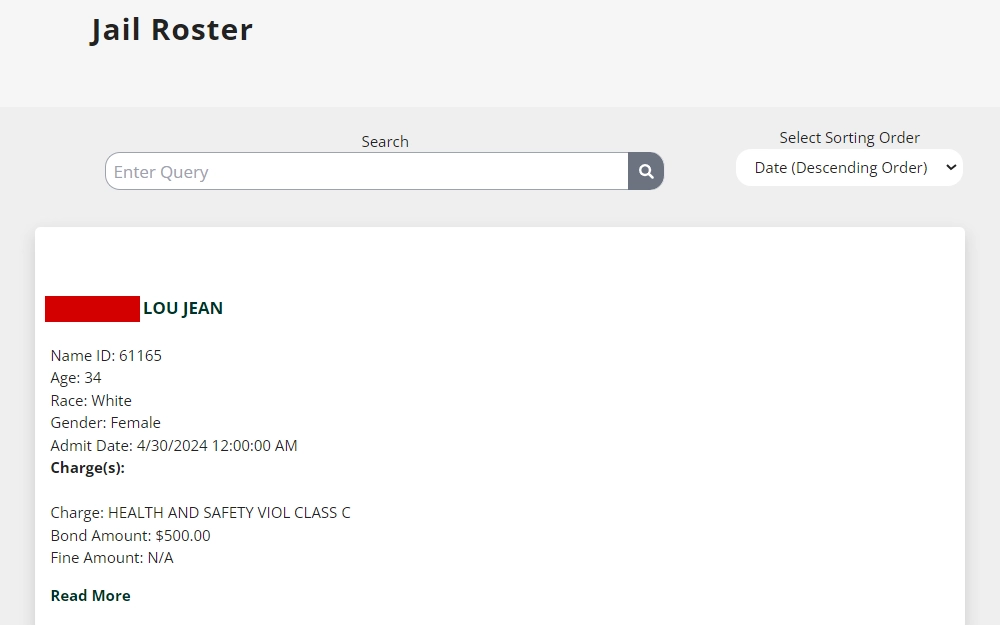
The list below shows the counties in Texas that do not have online links to search for jail inmates or the county does not have a working jail and contracts with other counties to house arrestees. To learn about inmates in any of these counties, the searcher would need to call the number listed for that county.
Texas also uses VINELink as a way for victims to find out where offenders are being held.
County Jails or Sheriff’s Offices That Do Not Have a Search Link:
- Anderson County Sheriff’s Office (903-731-8209)
- Atascosa County Sheriff’s Office (830-769-3434)
- Austin County Sheriff’s Office (979-865-3111)
- Bailey County Sheriff’s Office (806-272-7619)
- Bandera County Sheriff’s Office (830-796-7759)
- Bastrop County Sheriff’s Office (512-549-5073)
- Bosque County Sheriff’s Office (254-435-9966)
- Bowie County Sheriff’s Office (903-798-3149)
- Brooks County Sheriff’s Office (361-325-3696)
- Burleson County Sheriff’s Office (979-567-4343)
- Burnet County Sheriff’s Office (512-715-8600)
- Caldwell County Sheriff’s Office (512-398-6777)
- Cameron County Sheriff’s Office (956-544-0865)
- Chambers County Sheriff’s Office (409-267-2507)
- Cherokee County Sheriff’s Office (903-683-2271)
- Colorado County Sheriff’s Office (979-732-2388) x236
- Comal County Sheriff’s Office (830-620-3450)
- Dallam County Sheriff’s Office (806-244-2541)
- Eastland County Sheriff’s Office (254-629-3899)
- Fannin County Sheriff’s Office (903-640-4171)
- Fayette County Sheriff’s Office (979-968-5856)
- Fisher County Sheriff’s Office (325-776-2273)
- Garza County Sheriff’s Office (806-990-9974)
- Gillespie County Sheriff’s Office (830-997-7585)
- Goliad County Sheriff’s Office (361-645-3451)
- Gonzales County Sheriff’s Office (830-672-6362)
- Grayson County Sheriff’s Office (903-893-4388)
- Gregg County Sheriff’s Office (903-236-8400)
- Grimes County Sheriff’s Office (936-873-6439)
- Hale County Sheriff’s Office (806-293-5377)
- Hardeman County Sheriff’s Office (940-663-5374)
- Harrison County Sheriff’s Office (903-923-4003)
- Hartley County Sheriff’s Office (806-244-2541)
- Henderson County Sheriff’s Office (903-677-6322)
- Hill County Sheriff’s Office (254-582-5313)
- Hopkins County Sheriff’s Office (903-438-4040)
- Houston County Sheriff’s Office (936-544-2862)
- Howard County Sheriff’s Office (432-264-2231)
- Hunt County Sheriff’s Office (903-453-6851)
- Jack County Sheriff’s Office (940-567-2221)
- Jackson County Sheriff’s Office (361-782-5407)
- Jasper County Sheriff’s Office (409-384-2411)
- Jeff Davis County Sheriff’s Office (432-426-3213)
- Kerr County Sheriff’s Office (830-895-2705)
- Lampasas County Sheriff’s Office (512-556-8255)
- LaSalle County Sheriff’s Office (830-879-3045)
- Lee County Sheriff’s Office (979-542-2800)
- Limestone County Sheriff’s Office (254-729-3278)
- Live Oak County Sheriff’s Office (361-449-8041)
- Loving County Sheriff’s Office (432-377-2411)
- Madison County Sheriff’s Office (936-348-2755)
- Marion County Sheriff’s Office (903-665-7201)
- Mason County Sheriff’s Office (325-347-6937)
- Maverick County Sheriff’s Office (830-773-2321)
- Medina County Sheriff’s Office (830-741-6058)
- Nolan County Sheriff’s Office (325-235-5471)
- Nueces County Sheriff’s Office (361-887-2222)
- Ochiltree County Sheriff’s Office (806-435-8000)
- Potter County Sheriff’s Office (806-335-4100)
- Presidio County Sheriff’s Office (432-729-4308)
- Rains County Sheriff’s Office (903-473-3181)
- Reeves County Sheriff’s Office (432-445-4901)
- Refugio County Sheriff’s Office (361-526-1698)
- San Augustine County Sheriff’s Office (936-275-2424)
- San Patricio County Sheriff’s Office (361-364-9630)
- Somervell County Sheriff’s Office (254-897-2242)
- Starr County Sheriff’s Office (956-487-5571)
- Taylor County Sheriff’s Office (325-674-1300)
- Terrell County Sheriff’s Office (432-345-2525)
- Tyler County Sheriff’s Office (409-283-6331)
- Upshur County Sheriff’s Office (903-843-2541)
- Upton County Sheriff’s Office (432-693-2422)
- Waller County Sheriff’s Office (979-826-8282)
- Wheeler County Sheriff’s Office (806-826-5537)
- Wichita County Sheriff’s Office (940-766-8170)
- Willacy County Sheriff’s Office (956-689-5576)
- Wilson County Sheriff’s Office (830-393-2535)
- Winkler County Sheriff’s Office (432-586-3461)
- Wise County Sheriff’s Office (940-627-5971)
County Jail Not Listed on Website:
- Armstrong County Sheriff’s Office (806-537-3511)
- Baylor County Sheriff’s Office (940-889-3333)
- Bee County Sheriff’s Office (361-362-3221)
- Blanco County Sheriff’s Office (830-868-7104)
- Borden County Sheriff’s Office (806-756-4311)
- Brewster County Sheriff’s Office (432-837-3488)
- Briscoe County Sheriff’s Office (806-823-2135)
- Calhoun County Sheriff’s Office (361-553-4646)
- Camp County Sheriff’s Office (903-856-6651)
- Carson County Sheriff’s Office (806-537-3511)
- Cass County Sheriff’s Office (903-756-7511)
- Castro County Sheriff’s Office (806-647-3311)
- Childress County Sheriff’s Office (940-937-2535)
- Coke County Sheriff’s Office (325-453-2717)
- Collingsworth County Sheriff’s Office (806-447-2588)
- Concho County Sheriff’s Office (325-869-4941)
- Cottle County Sheriff’s Office (806-492-3131)
- Crane County Sheriff’s Office (432-558-3571)
- Crockett County Sheriff’s Office (325-392-2661)
- Crosby County Sheriff’s Office (806-675-7301)
- Culberson County Sheriff’s Office (432-283-2060)
- Dawson County Sheriff’s Office (806-872-7560)
- Delta County Sheriff’s Office (903-395-2146)
- Dickens County Sheriff’s Office (806-623-5533)
- Dimmit County Sheriff’s Office (830-876-3508)
- Donley County Sheriff’s Office (806-874-3533)
- Duval County Sheriff’s Office (361-279-6209)
- Falls County Sheriff’s Office (254-883-1431)
- Floyd County Sheriff’s Office (806-983-4905)
- Foard County Sheriff’s Office (940-684-1501)
- Franklin County Sheriff’s Office (903-537-4539)
- Freestone County Sheriff’s Office (903-389-3236)
- Frio County Sheriff’s Office (830-334-3311)
- Gaines County Sheriff’s Office (806-546-0520)
- Glasscock County Sheriff’s Office (432-354-2361)
- Gray County Sheriff’s Office (806-669-8022)
- Hall County Sheriff’s Office (806-259-2151)
- Hamilton County Sheriff’s Office (254-386-8128)
- Hansford County Sheriff’s Office (806-659-4140)
- Haskell County Sheriff’s Office (940-864-2345)
- Hemphill County Sheriff’s Office (806-323-5326)
- Hudspeth County Sheriff’s Office (915-369-2161)
- Irion County Sheriff’s Office (325-835-2551)
- Jim Hogg County Sheriff’s Office (361-527-4140)
- Jones County Sheriff’s Office (325-823-3201)
- Karnes County Sheriff’s Office (830-780-3931)
- Kenedy County Sheriff’s Office (361-294-5205)
- Kent County Sheriff’s Office (806-237-3801)
- Kimble County Sheriff’s Office (325-446-2766)
- King County Sheriff’s Office (806-596-4413)
- Kinney County Sheriff’s Office (830-563-2788)
- Knox County Sheriff’s Office (940-459-2191)
- Lamar County Sheriff’s Office (903-737-2400)
- Lamb County Sheriff’s Office (806-385-7900)
- Leon County Sheriff’s Office (903-536-2749)
- Lipscomb County Sheriff’s Office (806-862-2611)
- Llana County Sheriff’s Office (325-247-5767)
- Lynn County Sheriff’s Office (806-561-4505)
- McMullen County Sheriff’s Office (361-274-3311)
- Menard County Sheriff’s Office (325-396-4705)
- Mitchell County Sheriff’s Office (325-728-5261)
- Morris County Sheriff’s Office (903-645-2232)
- Motley County Sheriff’s Office (806-347-2234)
- Newton County Sheriff’s Office (409-379-3636)
- Oldham County Sheriff’s Office (806-639-2174)
- Pecos County Sheriff’s Office (432-336-3521)
- Real County Sheriff’s Office (830-232-5201)
- Roberts County Sheriff’s Office (806-868-3121)
- Sabine County Sheriff’s Office (409-787-2266)
- San Jacinto County Sheriff’s Office (936-653-4367)
- San Saba County Sheriff’s Office (325-372-5551)
- Schleicher County Sheriff’s Office (325-853-2737)
- Scurry County Sheriff’s Office (325-573-3551)
- Sterling County Sheriff’s Office (325-378-4771)
- Stonewall County Sheriff’s Office (940-989-3333)
- Sutton County Sheriff’s Office (325-387-2288)
- Swisher County Sheriff’s Office (806-995-3326)
- Throckmorton County Sheriff’s Office (940-849-8855)
- Trinity County Sheriff’s Office (936-642-1424)
- Uvalde County Sheriff’s Office (830-278-4111)
- Val Verde County Sheriff’s Office (830-774-7513)
- Ward County Sheriff’s Office (432-943-6703)
- Wilbarger County Sheriff’s Office (940-552-6205)
- Yoakum County Sheriff’s Office (806-456-2377)
- Zapata County Sheriff’s Office (956-765-9960)
- Zavala County Sheriff’s Office (830-374-3615)
Counties jails house the majority of pre-trial inmates in Texas; however, there are some cities with holding facilities as well.
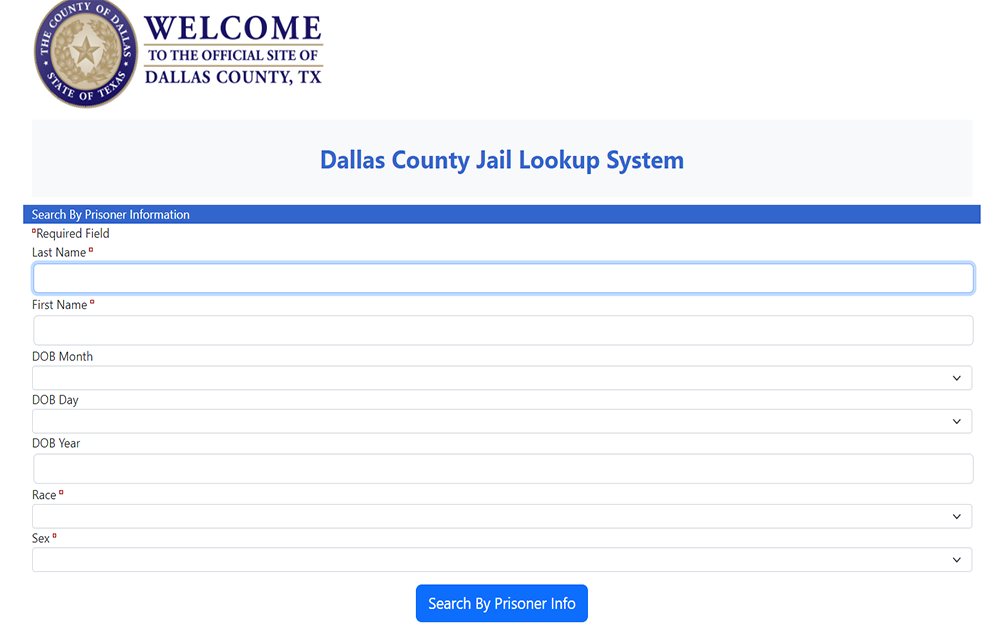
Alternatively, anyone can take the following steps to find recent arrests within their county:
- Open a search engine such as Google and type “[your county] inmate lookup.” Ex. “Dallas County inmate lookup”.
- Next, check the first 1-3 results for a .gov, .us, or .org link. It may be .com on occasion. The first result leads to the Dallas County Jail Lookup System.
- Once on the county website, look for “jail roster”, “inmate finder” and other similar terms.
- Now, enter the person’s name to see if they’re in that county jail.
Look Up Recent Arrests & Mugshots in Texas’ City Jails
Texas has 350 city or municipal jails or holding facilities. These are often used for very short-term detainment and booking of inmates until they can be transferred to a county jail.3
County jails should be checked first; however, if someone was arrested by a local police department and is not located at the county jail, calling the police department is the next step. Some of the larger departments also have online search portals to locate municipal inmates.
For example, the Austin Police Department has an online booking photo portal that can be used to see mugshots of individuals arrested in Austin and later transported to the jail in Travis County. Frisco City Jail inmates, on the other hand, can be located by calling the facility at 972-292-6001.
So if someone is in a city jail, use a search engine and type “[Name of City] city jail inmate lookup”. Or to find Austin’s city jail inmate roster, the search query would be “Austin City jail inmate lookup.”
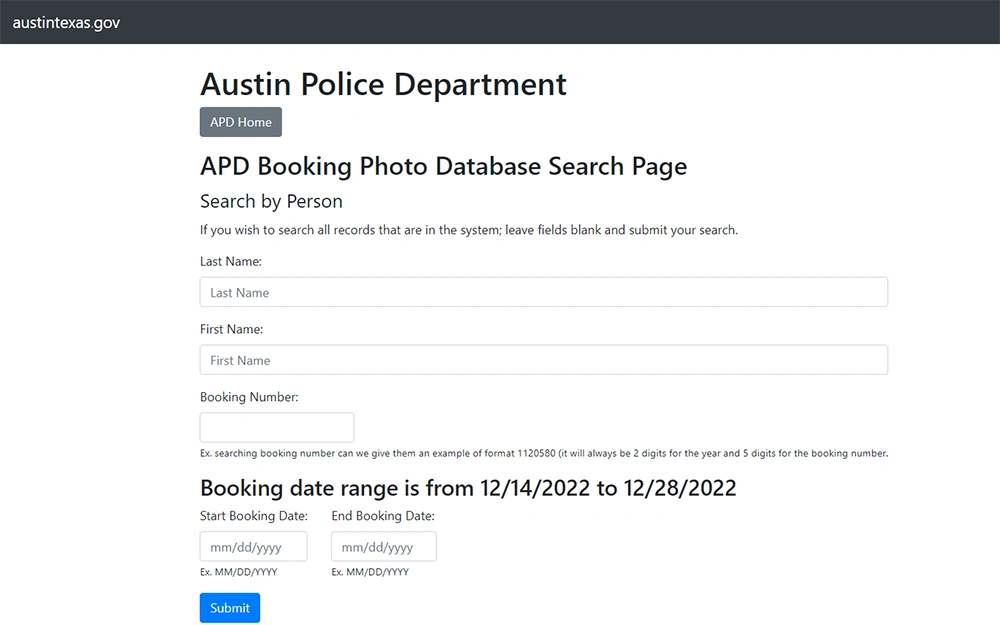
Local jails keep records of daily arrests or current arrests, how to find out if someone was arrested and how to find out what someone was arrested for. Individuals can call the local police department to find out if someone is in custody after an arrest.
How To Conduct a Texas Public Arrest Record Search (Statewide Lookup)
A statewide search of arrest records in Texas can be completed online through the Department of Public Safety. Arrest records are provided as part of an overall criminal history search, which is discussed under the heading How To Run a Statewide Criminal Record Search in Texas Through the Texas Department of Public Safety below.
How To Contact an Inmate & Post Bail in Texas
Posting a bond is at the front of the mind of the person who has been arrested. When a friend or family member has been taken into custody, information on how to bail them out of jail can be obtained by calling the jail where the person is housed.
Additionally, family and friends can appear in court during arraignment when a person is arrested in Texas to see what bond is set and how to post it.
A third option is to hire a bail bondsman in the Texas county where the person was arrested to get the individual released. A bail bondsman can also help locate an inmate if family or friends are having difficulty pinpointing where the arrestee is being held.
Many of the county sheriff’s office sites post a list of bail bondsmen in the area that can help post bail for a Texas arrestee.
Finally, family or friends can hire an attorney to help make contact with an arrestee and negotiate a release. An attorney may be able to get a jail inmate released on his or her own recognizance, which simply means the person is released on a promise to appear in court at a later date without having to pay money or provide property to ensure the person will return for a hearing.
The attorney can also how to find out if someone is in jail or who’s in jail. An attorney is also how to find out someone’s charges in jail.
The tables outlined earlier lists a contact number for each jail or sheriff’s office that can be called to find out visitation and bond information for an inmate.
To research court records, individuals must go to the county clerk of court’s office and review records at the public terminals provided. The Texas Judicial Branch does not maintain a centralized online database that can be accessed by the public.
How To Use Each County’s Court Case Access To Conduct a Texas Criminal Record Search
A list of district courthouses and clerks can be found on the Texas Courts website. To locate a list of county clerks, complete the following steps:
- Open the Texas Courts’ website.
- Select Judicial Directory from the drop-down menu under Judicial Data.
- To access a list of court personnel and locations by county, click District, County & Justice Court Judges & Personnel by County. This will list all judges, district clerks and justices of the peace for each county in an alphabetical list for Texas.
- Scroll to the county where the record was generated to get the physical address of the courthouse. Go to the courthouse to request records from the District Clerk or use one of the public terminals available.
- Individuals can also visit each district clerk of court’s website to get information on how to access records, or can call the district clerk to ask about online record access. Some clerk’s offices do have an online portal for court records, but not all maintain an online database.
How To Run a Statewide Criminal Record Search via the Texas Department of Public Safety
To get an official statewide criminal record check, searchers must go through the Texas Department of Public Safety, Criminal Records Division. The division provides an online portal for individuals, businesses, agencies or organizations to request a criminal background check.
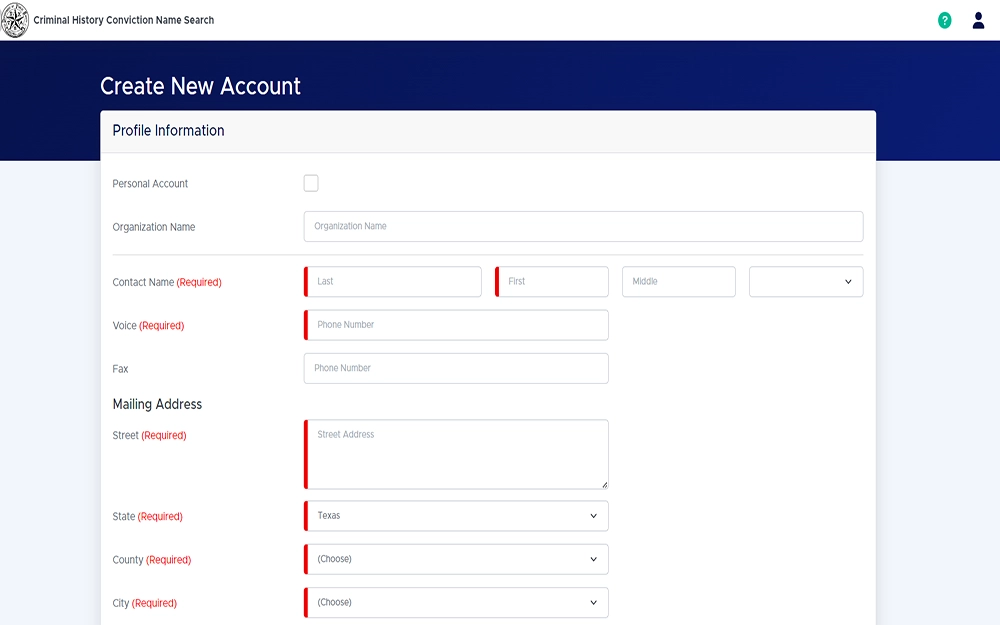
The steps to making a request are listed below.
- Visit the Texas Department of Public Safety website.
- Select Crime Records from the menu options at the top of the page.
- Select the type of search needed (name-based, fingerprint search or sex offender search).
- Log into the account for a name-based criminal history conviction search or create an account.
- Schedule fingerprinting for a fingerprint-based search for the person.
- For a sex offender search, click Texas Registry Search on the page. Enter the registrant’s name and click search.
- Sex offender data is returned immediately. A criminal history search can also be returned within minutes of making the online request. Fingerprint-based searches include national data and can take several days.
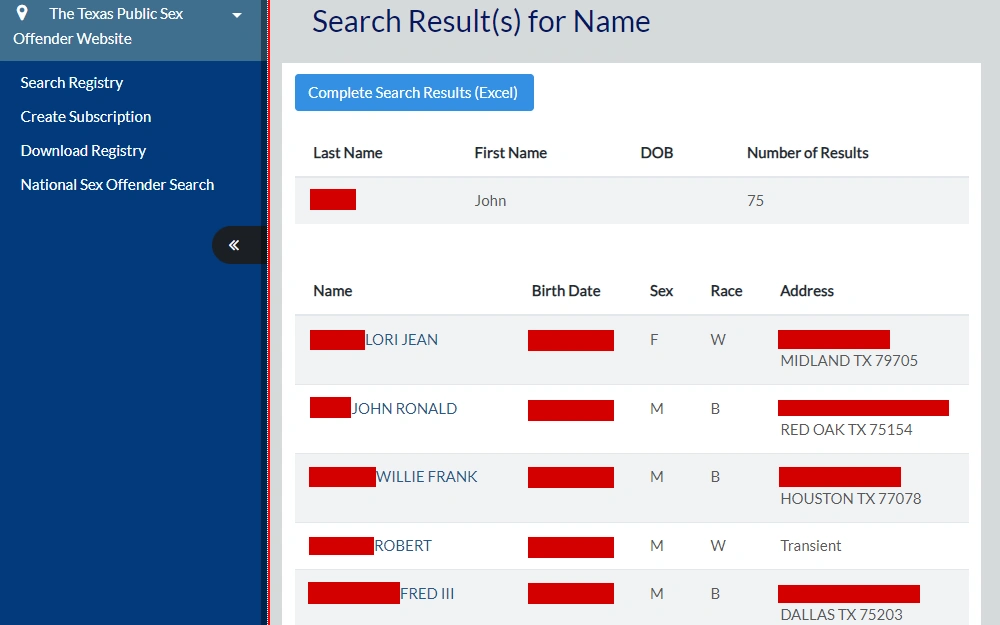
Fingerprint-based searches can also be requested through the Texas Department of Public Safety. Fingerprint searches are scheduled through the FAST (Fingerprint Applicant Services of Texas) locations which physically takes the fingerprints and processes them through IdentoGO.4
Fingerprint searches cover both statewide records and national criminal history or FBI rap sheet.
How To Obtain a Copy of Criminal Records in Texas
As stated earlier, the Texas Department of Public Safety is the source for an official state background check. Follow the steps outlined above to complete and request criminal records in Texas.
The Texas DPS maintains the state criminal record repository, but it is not the only source of records in the state.
Records can also be requested at the local sheriff’s office or police department and through the district clerk of court’s office in the area where the person was charged or convicted. This is one way someone can find out how I know if I have been charged with a crime.
The tables above list contact information for each county sheriff’s department in the state and individuals can reach out to the departments to submit a record request. Many counties require filling out a form or making the request in writing to obtain a record.
How To Determine if Someone Is on Probation or Parole in Texas
Parolees can be located using the Inmate Search/Parole Review Information link on the Texas Department of Criminal Justice website. This name-based search will show if the person is still in custody at a state prison or has been released to community supervision by the parole board.
To search the parolee database, individuals will need to open the Texas Department of Criminal Justice website, click the Inmate Search link, and enter the individual’s name or TDCJ Number. The information will show if the person has been released, the date of release and the conditions of parole.
Additional parole information can be located by clicking Parole Review Information on the inmate’s data page, while full step-by-step Texas parolee lookup instructions can assist with a streamlined and efficient search.
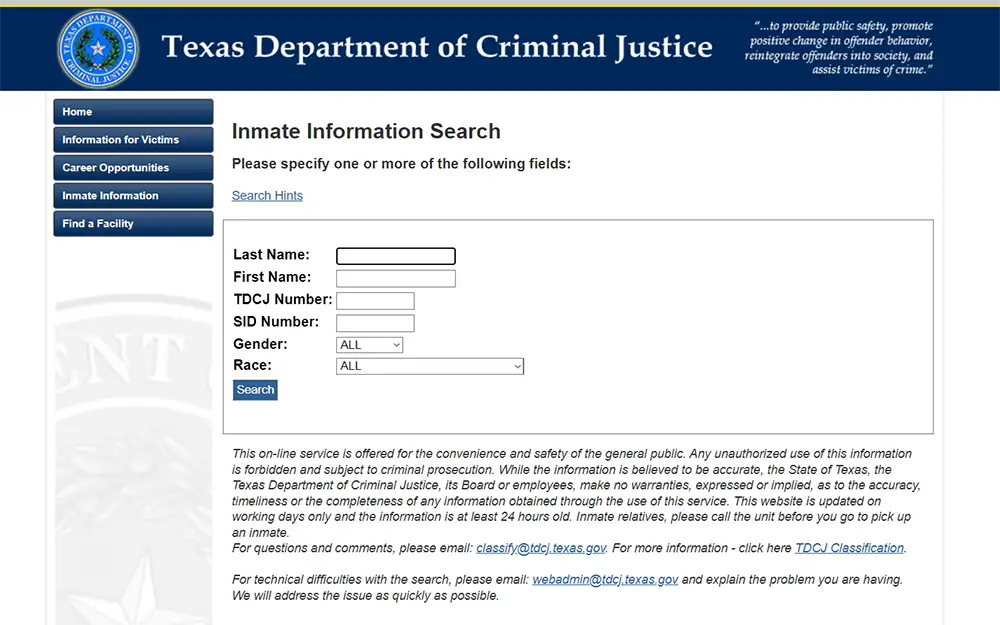
Citizens can also start a probation search in Texas by contacting the local district clerk of court with a record request to see sentencing information. Probation records can also be obtained as part of the criminal conviction report through the Texas Department of Public Safety online portal.
To get information directly from the courts, use the table posted above for the county of conviction and supervision.
Unless a matter has been expunged by the courts, it will show up on a criminal background check including community corrections such as probation and parole.
Steps To Seal or Expunge a Criminal Record in Texas (Misdemeanors, Felonies & Non-Convictions in TX)
Expunging records in Texas are outlined in Title 1-Code of Criminal Procedures of the Texas state statutes. The following matters are eligible for expungement in Texas:
- Person was arrested for a felony or misdemeanor that subsequently resulted in a non-conviction. At this point, the individual can petition to have the Texas arrest records for this charge expunged. This also applies if the person was convicted and later pardoned or the conviction was overturned in an appeal or retrial.
- Convicted of the crime of unlawfully carrying a weapon before 1 September 2021.
- Person was charged and the matter was later dismissed or dropped and the individual was not placed on any community supervision.
- The statute of limitations for prosecution has expired without the matter being brought to court. This will remove records of arrest and investigative notes from the record and cannot be used against the person.
House Bill 3016 allows for the expungement of first time misdemeanor convictions as well. This second chance law was designed to give non-violent, first-time offenders an opportunity to clear their record to decrease the negative impact a criminal conviction record can have on employment.
Felony convictions in Texas cannot be expunged from a person’s record at this time; therefore, any felony convictions will continue to appear on a criminal background check indefinitely.5
The procedures for expunging a non-conviction or a first-time conviction are the same. The defendant must petition the court to request the expungement.
The court will look at the facts and weigh the matter. If an order for expungement is granted, the order is sent to the clerk of court’s office and law enforcement agency outlining what is to be destroyed and the deadline.
The defendant must appear in court after filing the petition. This hearing is usually set within 30 days of filing.
Once the matter is heard, the expungement can be ordered at the hearing, or it can take up to six months for the judge to decide on an expungement petition following the hearing.5
How To Locate Someone in Texas State or Federal Prisons
Texas has fifteen federal prisons in the state. To locate an inmate at these facilities, the searcher should follow the steps below.
- Open the Federal Bureau of Prison website.
- Select Find an Inmate from the Inmate drop-down menu.
- Choose Find By Name to do a name-based search on the online form that appears.
- Enter the inmate’s first and last name and click Search on the form. Race, age and sex can also be entered but are not required to conduct a search.
- From the list of inmates, click on the one that matches. For more common names, the searcher may have to look through several records before finding the correct one.
The list will show the location of those inmates currently in custody. For Texas federal inmates, look for one of the Texas locations in the right-hand column in the list.
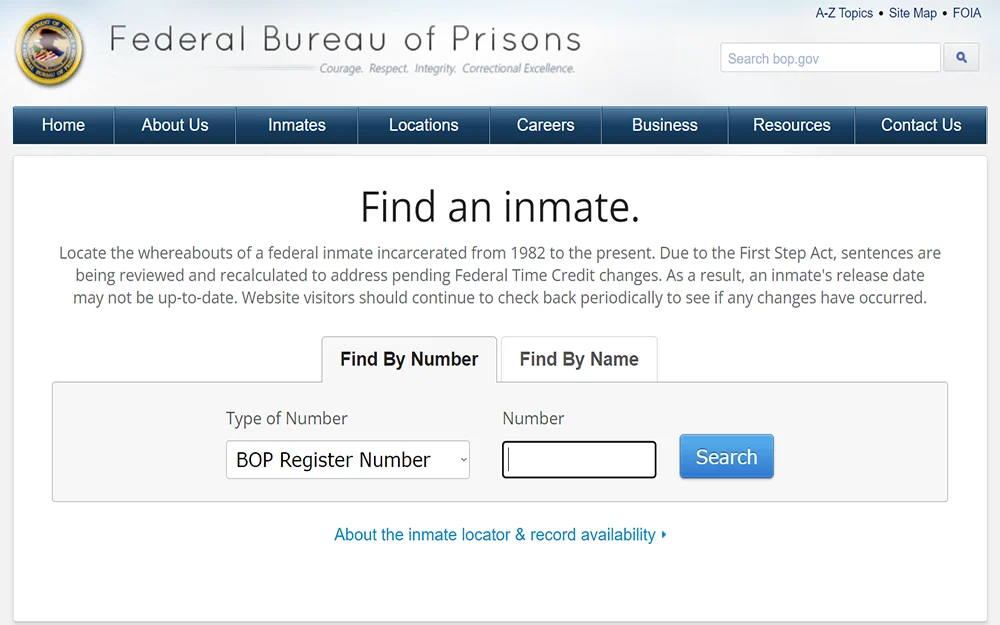
Search results will include the inmate’s name, location (or dates of release), age, race and register number.6
To locate a state correctional inmate in Texas, complete the following:
- Open the Texas Department of Criminal Justice website.
- Click on Inmate Information, then select Online Inmate Search from the drop-down menu.
- Enter the person’s first and last name and click search to see if they are currently in prison in Texas.
The information available on Texas prisoners includes name, race, age, gender, TDCJ number, where the person is housed, projected release date, projected parole hearing date, if the person can receive visitors and offense history.7
How To Conduct a Warrant Search in Texas (Find Wanted Individuals in TX)
When a warrant is issued in Texas, it may or may not be made publicly available. Federal warrants are maintained by the US Marshal’s Office and are not released to the public.
The Warrant Information System, or WIN, is only available to law enforcement, so the general public cannot access federal warrants. Individuals usually do not know a federal warrant for their arrest has been issued until it is served on them.8
State warrants are those issued by Texas local or state law enforcement agencies and may be made available to the public on the agency’s official website. The sheriff’s department table that lists offender search portals can also be used to see if the department publishes warrants online.
A search of a local police department or sheriff’s department website can reveal details of warrants issued in Texas. For example, the Austin Police Department has an online search portal for active warrants.
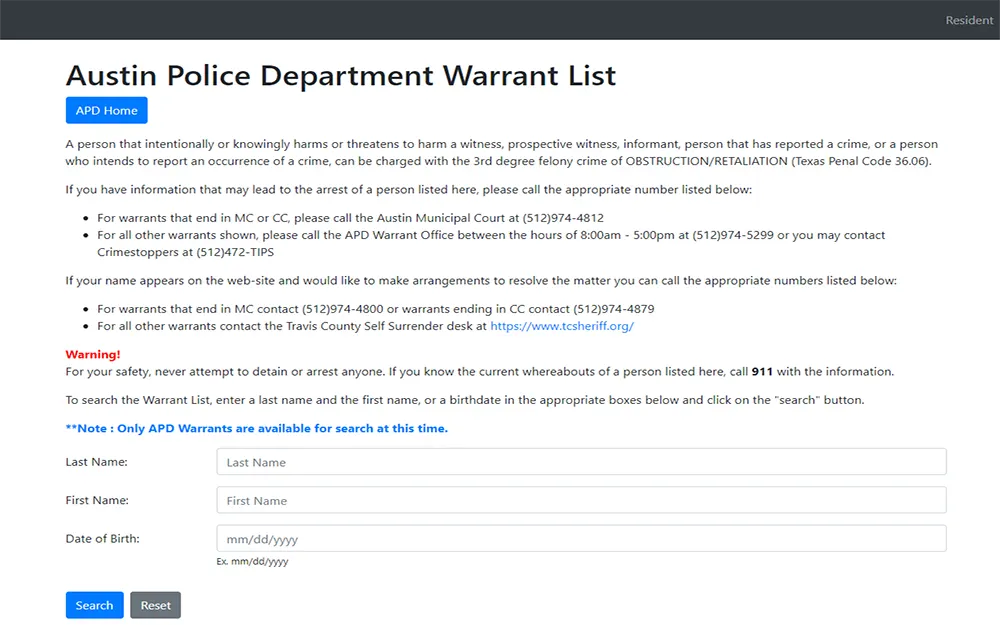
Search results will show active warrants based on the alleged offender’s name, date of birth, race, sex, bond amount, charges and charges.9 Houston Police Department, on the other hand, does not publish warrant lists, but Harris County Sheriff’s Office where Houston is located does publish an online directory that can be searched using the person’s name.
Interested parties can streamline their search by reviewing the instructions for looking up warrants in Harris County; this resource offers clear guidance on obtaining information on anyone wanted in the area.
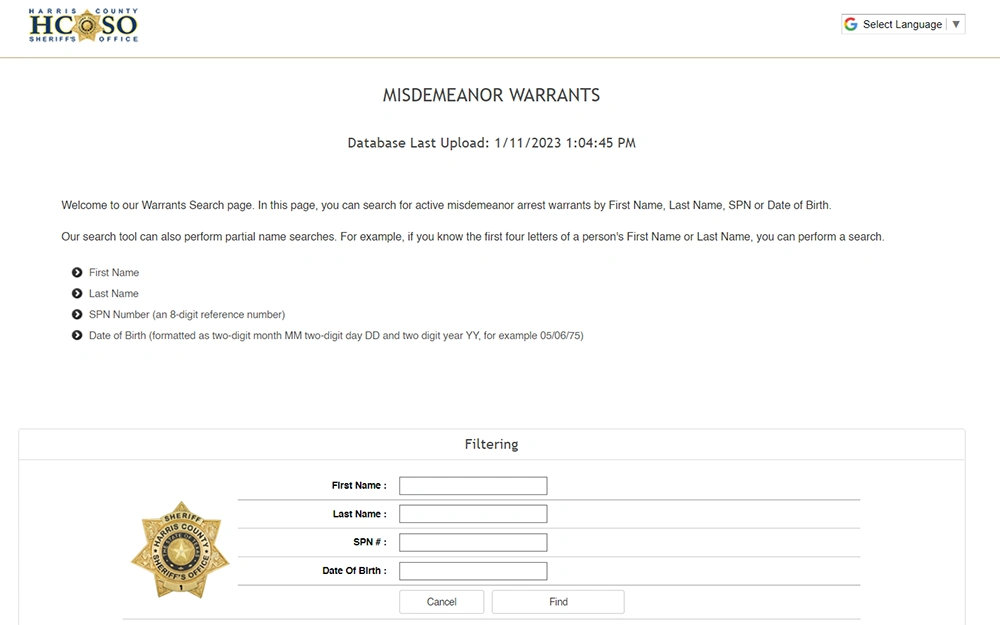
Warrants are not convictions and should not be viewed as proof of guilt. Warrants are issued to secure someone’s appearance in court and is not an admission of guilt or a finding of guilt.
A Review of Texas Background Checks & Screening Agencies
There are several agencies and organizations in Texas that perform or require a criminal background check. The table below lists each of these agencies and what they cover regarding screenings:
| Agency That Performs or Requires Background Checks | Screening Reasons |
| Texas Department of Public Safety |
|
| Texas Medical Board |
|
| Texas Board of Nursing |
|
| Texas Department of Licensing and Regulation |
|
| Texas Health and Human Services |
|
| Texas Education Agency |
|
These agencies search applicant backgrounds to look for disqualifying offenses such as violent felonies or sex offenses.
Background checks through the agencies are looking for disqualifying offenses that would prevent a person from working a certain position in Texas. Some disqualifying offenses in Texas include the following:
- Homicide
- Kidnapping
- Sexual abuse of children
- Injury to children, elderly or disabled persons
- Sexual assault
- Aggravated assault
- Child endangerment
- Arson
- Robbery
- Indecent exposure
- Terroristic threats
- Money laundering
- Medicaid fraud
- Cruelty to animals10
How To Check the Texas Sex Offender Registry
The Texas sex offender registry is maintained by the Department of Public Safety. To search the registry, follow these steps:
- Open the Texas Department of Public Safety website.
- Scroll to the bottom of the page and click Search Sex Offender Registry.
- Click the Texas Registry Search link in the description.
- Enter the person’s first and last name and click Search.
- Click the name from the list that appears to see details.
Texas sex offenders can also be searched using the Dru Sjodin National Sex Offender Registry; however, it is always best to start directly on the state site. When searching the national registry, the individual is directed to the state site listed above.
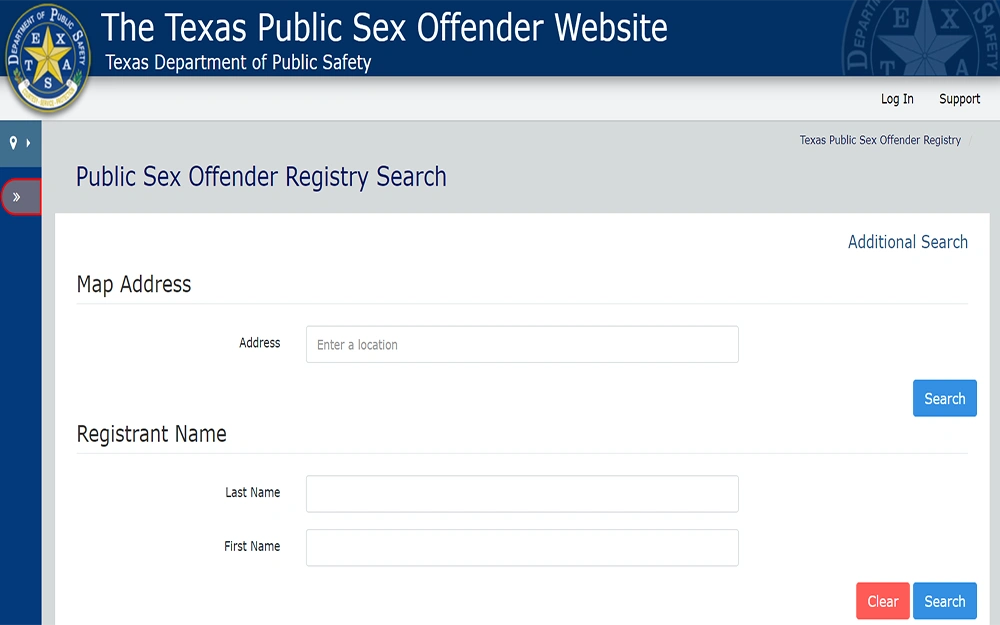
Information on the state sex offender registry includes the offender’s name, statute for the charge of conviction, location, mugshot and photos for each time the individual re-registers with the local sheriff’s office, and identifying information about the offender.
Search the Texas Prescription Monitoring Program To Identify Prescription Drug Abusers
Doctors and pharmacists can access the Texas Prescription Monitoring Program website to search for individuals who are identified as prescription drug abusers. Approved law enforcement personnel can also access the database when a search warrant or subpoena is issued requesting the information.
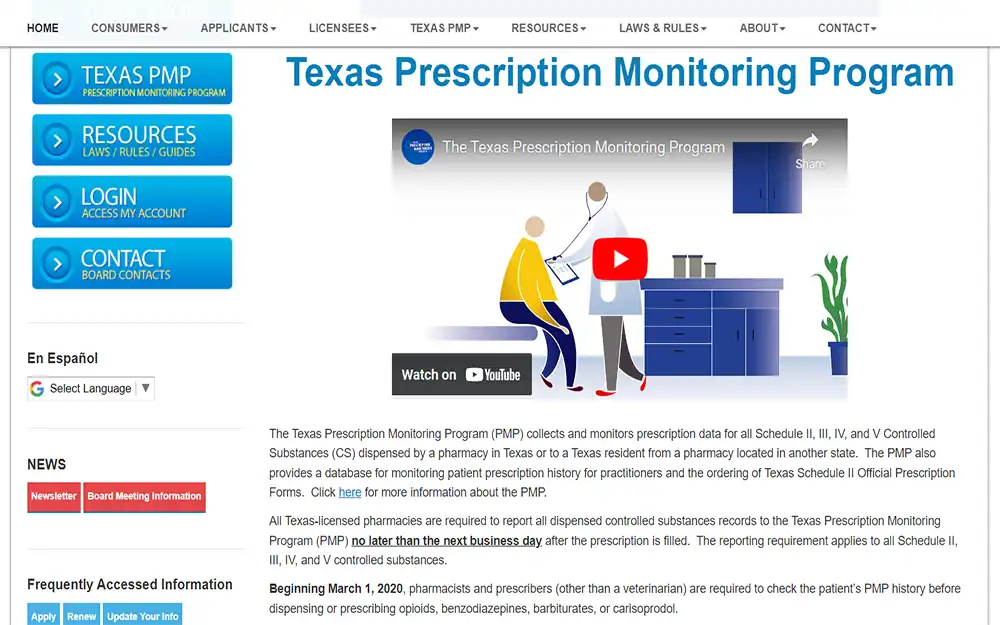
Information for law enforcement is strictly limited to what is outlined in the subpoena or warrant.
Understanding Texas Laws Regarding Criminal & Arrest Records (Public Access)
All Texas background checks are subject to state and federal laws and must be in compliance. The Fair Credit Reporting Act limits the lookback period for credit history and non-convictions that have not been sealed to seven years.
The Equal Employment Opportunity Commission makes sure federal laws against discrimination are followed when criminal records are used for hiring decisions or tenant screenings. If someone feels a background check was used in a discriminatory manner, a complaint can be filed with the EEOC.
State laws also regulate what can be contained in criminal records in Texas and how they can be used. The following statutes outline how background information can be shared and used in Texas.
When individuals use people finder software or agencies, they need to make sure the entity adheres to laws, policies and codes.
Texas Labor Code 52.031d makes blacklisting someone illegally in the state. Any statements provided by a prior employer must be factual.
The person making the reference should provide information in good faith and make sure it is not provided in an inflammatory manner.
Texas background checks can go back seven years for jobs that pay under $75,000. Positions that pay over that amount can look back to the person’s 18th birthday.
Dismissed or dropped charges or those that resulted in non-convictions do not show up on any Texas background checks.11
Texas currently does not have a Ban the Box statute meaning employers can inquire about criminal history at any point during the application or hiring process. Texas employers are, however, bound by the laws enforced through the EEOC that prohibit discrimination, meaning the employer cannot use a background check that is designed to target a protected population.
The Texas Public Information Act does make all criminal convictions and arrests public information unless the matter has been sealed or expunged by a court or if the record pertains to a juvenile offender.
Individuals and organizations can request records through official government agencies on the local, state or federal level, or they can hire a background check company to locate records; however, records pulled for professional use must be in compliance with state and federal laws.
It is important to understand how to find and use background reports, and understand the laws that govern these reports. No matter the reason, this resource can be used to search criminal records in Texas, including arrest records, and both can help make informed decisions on personal or professional matters.
References
1Home. (n.d.). Texas Dept. of Public Safety. Retrieved December 7, 2022, from <https://publicsite.dps.texas.gov/ConvictionNameSearch/>
2Confidential Information under the Public Information Act | Office of the Attorney General. (n.d.). Texas Attorney General. Retrieved December 7, 2022, from <https://www.texasattorneygeneral.gov/open-government/members-public/confidential-information-under-public-information-act>
3Grissom, B. (2010, September 17). City Jails Unregulated Despite Deaths, Complaints. The Texas Tribune. Retrieved December 7, 2022, from <https://www.texastribune.org/2010/09/17/city-jails-unregulated-despite-deaths-complaints/>
4IdentoGO Centers are the United States’ leader in identity solutions. (n.d.). Identogo. Retrieved December 7, 2022, from <https://www.identogo.com/locations>
5Silva, J. (2022, February 14). Crimes That Can Be Expunged in Texas | J.D. Silva & Associates. J.D. Silva & Associates | Law Firm for Personal Injury and Criminal Defense. Retrieved December 7, 2022, from <https://jdsilvalaw.com/blog/criminal-defense/crimes-that-can-be-expunged-in-texas/>
6Federal Inmates By Number. (n.d.). BOP. Retrieved December 7, 2022, from <https://www.bop.gov/inmateloc/>
7Home. (n.d.). Texas Department of Criminal Justice. Retrieved December 7, 2022, from <https://inmate.tdcj.texas.gov/InmateSearch/viewDetail.action?sid=06590340>
8Warrant Information System. (n.d.). U.S. Marshals Service. Retrieved December 7, 2022, from <https://www.usmarshals.gov/freedom-of-information-act/reading-room/warrant-information-system>
9Austin PD. (2012, October 29). Austin PD Warrant Search. Retrieved December 7, 2022, from <https://services.austintexas.gov/police/warrants/warrantresults.cfm>
10Appendix I, Criminal Convictions Barring Employment | Texas Health and Human Services. (n.d.). Texas Health and Human Services. Retrieved December 7, 2022, from <https://www.hhs.texas.gov/handbooks/consumer-directed-services-handbook/appendix-i-criminal-convictions-barring-employment>
11LABOR CODE CHAPTER 52. MISCELLANEOUS RESTRICTIONS. (n.d.). Texas Constitution and Statutes. Retrieved December 7, 2022, from <https://statutes.capitol.texas.gov/Docs/LA/htm/LA.52.htm#52.031>
12Texas Department of Public Safety. (2016, October). Application for Copy of Driver Record. Retrieved May 1, 2024, from <https://www.dps.texas.gov/internetforms/Forms/DR-1.pdf>
13Texas Online Public Information – Courts (TOPICs). Accessed 2 May 2023. <https://topics.txcourts.gov/ProtectiveOrdersPublic/>
14Welcome to the Texas Department of Public Safety | Department of Public Safety, 19 February 2020. Accessed 2 May 2023. <https://www.dps.texas.gov/>
15Randall County Sheriff’s Office. (2024). Jail Roster. Retrieved May 1, 2024, from <https://www.randallso.gov/inmates>
16Dallas County Online Jail Search.” Dallas County Online Jail Search. Accessed 2 May 2023. <https://www.dallascounty.org/jaillookup/search.jsp>
17APD Booking Photo Database Search.” AustinTexas.gov. Accessed 2 May 2023. <https://www.austintexas.gov/police/mug_shots/mug_shots.cfm>
18Dps.Texas.gov. Accessed 2 May 2023. <https://publicsite.dps.texas.gov/ConvictionNameSearch/>
19Texas Department of Public Safety. (2024). Search Result(s) for Name. The Texas Public Sex Offender Website. Retrieved May 1, 2024, from <https://publicsite.dps.texas.gov/SexOffenderRegistry/Search/Default/SearchByNames?lastName=Smith&firstName=John>
20Texas Department of Criminal Justice Inmate Search.” Texas.gov. Accessed 2 May 2023. <https://inmate.tdcj.texas.gov/InmateSearch/start.action>
21BOP: Federal Inmates By Number.” Federal Bureau of Prisons. Accessed 2 May 2023. <https://www.bop.gov/inmateloc/>
22Austin Police Department Warrant List.” AustinTexas.gov. Accessed 2 May 2023. <https://services.austintexas.gov/police/warrants/warrantsearch.cfm>
23Misdemeanor Warrants.” Harris County Sheriff’s Office. Accessed 2 May 2023. <https://apps.harriscountyso.org/JailInfo/warrants_search_results.aspx>
24The Texas Public Sex Offender Website. Accessed 2 May 2023. <https://publicsite.dps.texas.gov/SexOffenderRegistry>
25Texas Prescription Monitoring Program (PMP).” Texas State Board of Pharmacy. Accessed 2 May 2023. <https://www.pharmacy.texas.gov/PMP/>
